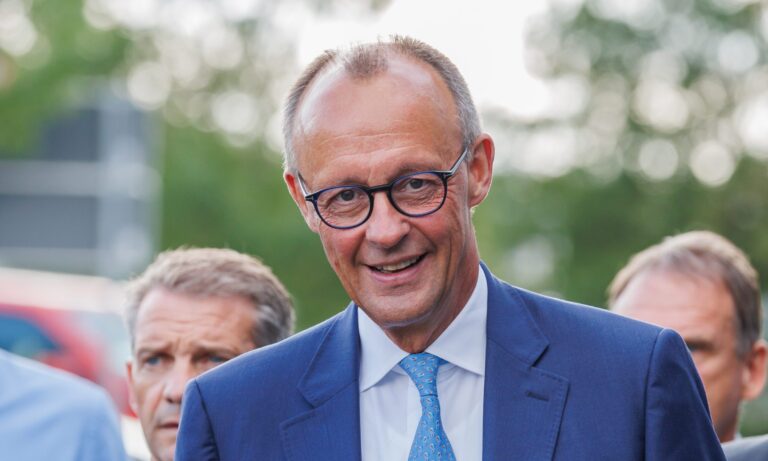Germany’s China Policy is Set for a Rethink After the Elections

This article is part of an exclusive new series from CHOICE focusing on China as a topic in elections across Central and Eastern Europe.
Germany under Angela Merkel has attempted to navigate a “middle way”, avoiding confrontation with China wherever possible. This has had both structural and personal rationale, but even over the last few years, the position has become increasingly difficult to maintain. With Angela Merkel out of office, we will see a change in direction in the German China debate regardless of who emerges victorious. That said, policy change itself will likely continue to be gradual.
Foreign policy decidedly did not play a large role in the run up to the German elections this year. Despite this absence, we can expect changes in Germany’s China debate – and policy – following the elections of a new government on September 26. China has received more attention than usual in various parties’ political programs, as analyzed by Ariane Reimers for MERICS earlier this year.
Both the Green Party and the FDP have discovered China as a topic where they can position themselves in opposition to the current government’s course. The SPD has also come out fairly strongly with a position paper calling for “assertive, rule-based and transparent” policy on China. While few would expect a revolution after the elections, we can expect a shift towards more hardline policy as such a shift has actually been underway for years, only to be stifled by Merkel’s chancellorship
Uncertain Outcome
The outcome of the German elections has rarely been less certain than this year.
Initially it seemed that Germany might have its first Green Chancellor in Annalena Baerbock. Later, Armin Laschet of Merkel’s CDU shortly seemed the most likely contender. Currently, a Chancellor Scholz seems the most likely scenario. But in a year of big surprises, this is anything but guaranteed. Compared to previous elections, it is likely that the government will consist of a coalition of three parties. With only a few exceptions, almost all options for possible coalitions to form the next German government are still open.
Rhodium‘s Noah Barkin has mapped the possible coalitions scenarios and what they could mean for China policy. While the exact constellation of the German government will of course play a role in how China policy will develop, there are also factors that are independent of it. Reduced to its basics, German China policy, especially the course to avoid confrontation over the past few years, was arguably most strongly driven by two factors, one structural and one personal.
Underlying Impetus
The structural factor, partial German business dependence on access to the Chinese economy, remains in principle, but it is here that we have already seen some shifts in the past few years.
Some industrial associations, most importantly the BDI, have openly pushed for a more critical course since 2019. This is a trend that will surely continue as an increasing number of companies look to reduce their exposure to the Chinese market.
The German debate is gradually changing from one that posits widespread dependence on the Chinese market to one that is more nuanced and looks at the details. Among the EU 27, Germany is indeed the most exposed to the Chinese market; however, the dependency is smaller than often thought.
In a study from 2019, Jürgen Matthes of the IW Köln estimated the nominal value-added exports to China to be at 2.8 percent of the overall nominal gross value added for Germany. Max Zenglein at MERICS has pointed out that a lot of the supposed economic dependency on China in fact goes both ways. Even in the most heavily exposed German automotive industry, the value created in China may be more important for the shareholders than for German job creation and the German economy writ large.
The personal factor is found in Angela Merkel’s own pessimism about the United States. As GPPi’s Thorsten Benner has argued, Angela Merkel’s position on China has not so much been informed by optimism about China’s political direction, but rather by a deep pessimism about Europe, the reliability of the United States, and future of the transatlantic Alliance.
Of course, this was in part due to the Trump factor – CNN reported a German official as saying that the number of people who were allowed to listen in on calls between Trump and Merkel was small due to Trump’s often aggressive conduct and proclivity to insult the Chancellor.
Skeptics of closer transatlantic cooperation are not optimistic about the Biden Administration either. In fact, many believe the new Oval office occupant may only provide a temporary respite as, in the future, a Trump-like character may re-emerge from the milieu of American politics.
The Bigger Picture
Despite such concerns, the solution for Europe cannot be to accommodate the demands of authoritarian countries. This is ultimately what is at stake in the German China debate.
After all, Angela Merkel’s line has had effects not only in Germany itself but also on European China policy. German (and French) unilateralism in crafting China policy at the European level, such as when the Comprehensive Agreement on Investment (CAI) with China was concluded in principle in a rush at the end of 2020, has angered not only the incoming Biden Administration, but also smaller EU member states. Germany’s smaller neighbors have arguably been ahead of the bigger countries in taking a more realistic view of China. While nobody should expect any miracles at the European level either, a less wobbly German position will help European China policy as well.
The strongest factor that will change once Angela Merkel departs may very well be the bolstered role of ministries vis-à-vis the Chancellery. Angela Merkel has been in power for almost sixteen years. Over this period, she accumulated a degree of power that won’t be rivaled by her successor in the near term, if ever. Over the Merkel years, the Chancellery took on an increasingly dominant position, allowing it to intervene in matters that would have traditionally been the affairs of other ministries.
Even if Merkel’s successor were inclined to attempt similar moves, they will be much harder to undertake. Instead, we are likely to see a strengthening of the various ministries in making China policy. That is not a bad thing.
Most importantly, perhaps, it will be increasingly difficult for any democratic country to avoid taking a stronger stance on China. China has retaliated against Lithuania for opening a Taiwan Office under what Beijing considers the wrong nomenclature, threatened the Czech Republic for a delegation of politicians’ visit to Taiwan, and has recently rejected a port of call for a German frigate. Except for the unlikely case that there is a fundamental change in the direction in Beijing itself, we are bound to see more and much stronger political confrontations in the coming years.
Between stronger ministries, the overall changes already evident in the China debate, and a situation in which it will be increasingly difficult to avoid offending China, change in policy is eminently likely. None of this is to say that German China policy will turn hawkish overnight, nor that such a turn would be a desirable outcome.
However, if the post-election landscape will allow Germany to rethink the relationship with China, this is an opportunity the country should not miss.
Written by
Mareike Ohlberg
MareikeOhlbergMareike Ohlberg is a Senior Fellow in the Asia Program and leads the Stockholm China Forum. Before joining GMF, Mareike worked as an Analyst at the Mercator Institute for China Studies, a postdoctoral fellow at Harvard University's Fairbank Center for Chinese Studies, and a Postdoctoral Fellow at Shih-Hsin University in Taipei. She is co-author of the book Hidden Hand: How the Communist Party of China is Reshaping the World (2020).


